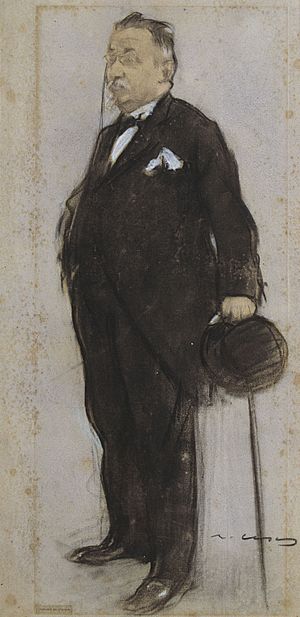Francisco Maspons y Labrós facts for kids
Francisco de Sales Maspons y Labrós (born in Granollers, Catalonia, Spain, in 1840 – died in Bigues i Riells, Catalonia, Spain, in 1901) was a famous Catalan folklorist. In Catalan, his name was Francesc de Sales Maspons i Labrós. He was also a lawyer and a notary. His sister, Maria del Pilar Maspons i Labrós, was a writer too.
Maspons y Labrós was a very important person in Catalan culture. He studied law and became a notary, which is a legal professional. He even became the head of the notary college in Barcelona.
His Role in Catalan Culture
Francisco Maspons y Labrós loved Catalan traditions and stories. He was a folklorist, meaning he studied and collected old stories, songs, and customs of his people. He helped keep these traditions alive.
He was also a leader in several important groups. In 1897, he led the Jocs Florals de Barcelona, which are like poetry contests that celebrate Catalan culture. From 1883 to 1891, he was the president of l'Associació d'Excursions Catalana, a group for exploring Catalonia.
He helped this group join with another one, l'Associació Catalanista d'Excursions Científiques. Together, they created the Centre Excursionista de Catalunya. This new center focused on exploring and studying Catalonia's nature and history. He was its president from 1892 to 1896.
Maspons y Labrós also wrote for many important magazines and newspapers. These included Lo Gai Saber, Calendari Català, and La Renaixença. His son, Francesc Maspons i Anglasell, also became a writer and published many works.
His Books and Collections
Francisco Maspons y Labrós wrote many books. Most of his works were about Catalan folklore and traditions. He collected popular stories and tales from different parts of Catalonia.
Here are some of his most well-known books:
- Lo Rondallayre: Contes Populars Catalans (Catalan Popular Tales); published in three parts from 1871 to 1875.
- Jochs de la infancia (Children's Games) (1874)
- Tradicions del Vallés (Traditions of Vallés) (1876)
- Les bodes catalanes (Catalan Weddings) (1877)
- De Mollet á Bigas (From Mollet to Bigas) (1882)
- Lo Vallès (The Vallès region) (1882)
- Fantasies y tradicions (Fantasies and Traditions) (1884)
- Cuentos populars catalans (Catalan Popular Stories) (1885)
- Semprevives (Everlastings) (1885)
- L'Excursionisme catalá (Catalan Excursionism) (1894)
- Miquel Grau (1894)
- Discurs illegit (Illegitimate Discourse) (1895)
See also
 | Precious Adams |
 | Lauren Anderson |
 | Janet Collins |


